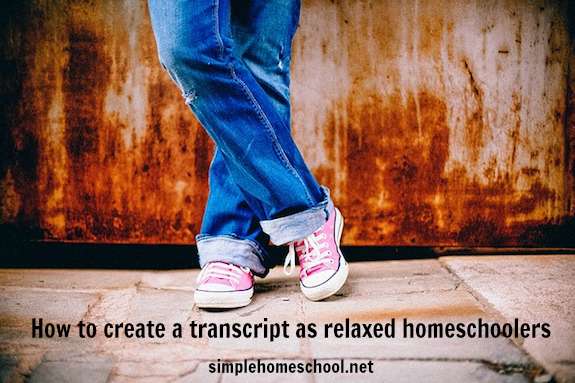How to create a transcript as relaxed homeschoolers ~
Written by Kara Anderson
A few years ago, I had a panic going on.
My son was starting middle school, and I felt like we had to get serious. After years of interest-led learning, and the gentleness of Waldorf, I convinced myself that we needed to switch gears and be able to clearly. quantify. all. learning.
In two years, he would be in high school, I reasoned. We needed to start thinking about The Transcript.
The Transcript haunted me.
I was really worried about how we were going to be able to show what he had learned when his learning felt a little “all over the place.” And I had nightmares of him not being able to get into college because of my failure to properly record the two weeks we spent watching the Ken Burns Vietnam documentary series.
Then one day I ran into my friend at Target. We caught up and I learned that her daughter had just started middle school! The only thing was … her daughter was in 6th grade.
And that’s how I learned that in our district, middle school starts in 6th grade. Not 7th grade like I had been thinking.
So the truth was, I was already a year behind in building The Transcript.
But honestly, running into the friend provided a wonderful wake-up call for me – it was a reminder that different school districts do things different ways, and that there really wasn’t any kind of rush.
We could certainly wait to start The Transcript until at least 9th grade, and it didn’t have to be this big overwhelming thing.
We didn’t have to change everything – we just had to find a way to document what we were already doing.
Deep breaths. So this year, we started The Transcript.
It certainly isn’t perfect, and we’re absolutely learning on the job here. Today, I wanted to share a bit about what that looks like:
How to create a transcript as relaxed homeschoolers

Plan backwards
As unschooly types, I don’t plan out much in advance. We like to follow the kids’ interests here, which means that long-term planning is sort of a fool’s errand.
I would rather spend my time finding resources for them in the midst of their own explorations, and occasionally setting up learning invitations.
So I plan backwards. That means that I write down what we do after we do it.
The benefit of this with transcript-building is that whatever I write down is already done, so it’s easy to document it without trying to remember if we actually did the thing I was hoping to do.
Refresh yourself on credits and units and all that jazz
This summer, I reached out to my pal Melissa, whose oldest daughter recently started college.
Here is what she told me:
“A year-long class is one ‘unit,’ a semester-long class is ½ unit.
A unit = between 120-180 ‘Carnegie units’
A Carnegie unit = 1 hour of instruction or 2 of practice
We counted reading, YouTube videos, curriculum, any kind of lessons, and discussion as ‘instruction.’ We counted hands-on stuff that didn’t involve new learning or processing as ‘practice.'”
After reading this, I felt my shoulders lift. This was so do-able!
(P.S. She also said Khan Academy SAT Prep is amazing.)
Record everything
I started a simple Google Sheet where I track everything. I add things by general subject, and just for fun, I color-code according to subject. That just helps me to see, OK, we’ve been doing a lot of history lately, but maybe not so much writing…
Then I can chat with my teen about that. Because guess what – a teen who really wants to go to college is invested in this process. Crazy, right?
I also set an alarm in my calendar, and once a month, I make sure I update The Transcript. That means I comb his room for library books that need to be returned anyway, projects that he’s completed, and look back at my bullet journal for what we’ve done that month.
Easy-Peasy.

It’s time to step up, kiddo
The great thing about teaching a high school kid is that they are usually 13- or 14-years-old, so it’s naturally time for them to take a little more personal responsibility.
Therefore, if you have a kid committed to going to college, you can get them to help keep their own transcript. Share that Google Sheet! Have them set an alarm in their phone.
If, on the other hand, your kid is a little “meh” on their future, don’t freak out. Which brings me to…
What about kids who might not want to go to college?
If your child is not planning on going to college, or isn’t sure what she or he wants to do after graduation, it’s smart to start a transcript anyway.
They don’t HAVE to use it. It isn’t going to hurt anything if they decide to go another route after high school.
BUT, if they do decide to pursue college, you’re not trying to invent a transcript last-minute.
And if they decide at 40 to go back to school, they don’t have to try to remember what they did for science 24 years ago.
So take heart, fellow relaxed homeschoolers – we can do this.
We can figure it out.
We’ve figured out everything else so far with parenting and homeschooling, right?
This is just another step we’re taking together.
Have you built a transcript with your child, or are you building one now? What tips would you share?
What’s Your Homeschool Mom Personality? Take Jamie’s quiz now and receive a free personality report to help you organize your homeschool based on what your personality type needs most!
Originally published October 2018


 Purva’s homeschool day in the life (with a 7-, 10-, and 11-year old)
Purva’s homeschool day in the life (with a 7-, 10-, and 11-year old)
In answer to your question at the end of your post, I would advise moms that it isn’t always “easy-peasy.” I’ve been doing it for 5 years now, for 4 teens, and it is often overwhelming and frustrating in spite of the simple formula. But that’s okay. I can do hard things, and so can my kids . . . and so can other homeschool moms. Don’t give up or think you’re doing it wrong just because it isn’t “easy-peasy.”
Hi Anne,
“Easy-peasy” was in reference to the paragraph directly above it about setting an alarm on my phone 🙂 Certainly there might be hard parts about creating a transcript with your child – this entire post is about how worried I was about the process! But just like you said, I also wanted to let moms know that sometimes the things we are afraid of turn out to be completely do-able. That was my goal with this post, not to make light of the process. Thanks for reading!
Kara’s latest post: The most important thing when you are homeschooling
Anne, I appreciate what you’re saying about things being challenging and being able to face the challenge, but I don’t think that’s what Kara was saying.
When I was applying for my PhD program, I was totally scared and intimidated. Me? Get a doctorate? Me, ignorant, first-generation-college, no-money, single-mom me? No way!
But then my mentor gave me the best piece of advice ever: Show up. In the right room. At the right time. With a notebook and a pen. Read the assigned reading. Respond to project prompts as best as you can. Meet with advisors. Use the curriculum map for the program. When you mess up, fix it. When you don’t understand, ask.
I thought to myself, “easy-peasy. I can do this. I can show up on time. I own a pen. I can read. I’m reasonably smart. I’m not afraid of asking questions.” Somehow, several years later, I ended up with a PhD. It was hard work; it was a challenge. But it was “easy-peasy” in the way Kara meant, I think.
I have been wondering how we are going to do this in a few years. Thankfully I already track everything (well everything I remember to write down) and hopefully in 4.5 years the laws won’t have changed too much in our state. Thanks for reminding me I really don’t need to worry about it til 9th grade here when grades start getting tracked for long term use.
Thank you so much for this! We’ve spent the past five years getting more and more relaxed in our homeschool, and I’ve been hating the idea of my son starting high school this fall because I didn’t want to lose that. The idea that “we don’t have to change everything – we just have to find a way to document what we are already doing” is a load off MY shoulders. Now to get better at recording everything lol…..
Hi Jen!
Yes. It takes some of the fear out of things to realize that you don’t have to change the way your child learns best, right?
This was soooo helpful! We too started 9th grade this year after 7 years of homeschooling as a family and didn’t want to give up doing some stuff together but all fall I’ve been feeling like nothing I do is right for my high schooler – it’s too easy for him or too hard for my 12 year old daughter. And transcripts….ugh. I LOVE the idea of planning backwards…it’s kind of been what I’ve ended up doing out of necessity but it’s awesome to hear it’s actually a “thing” 🙂 and that it makes sense. Woo! Hoo!
Question? How do you all keep track of the units for all those things like when you kid happens to mention they spent time looking up ideas for a project while you were at work or when your daughter spends three hours designing and sewing doll clothes then makes up her own magazine to display her designs…you know, all those “things” that should count for school time but if they hadn’t mentioned it or you see them doing it you wouldn’t know to put it in the plan book sort of stuff. I love that they are taking some initiative but how do I record all that stuff so I count it and how do you record it?
Would have been beneficial to include information on how to form a transcript or an actual document/format. It is great you figured it out though.
Really helpful way of thinking:). We just finished one up this week for an application for my second guy (!) and this was pretty much exactly the way we thought it through.
I appreciate your suggestion about considering a transcript even if your teen isn’t necessarily looking at college or looking right away. One of my teens (interestingly, the most academically inclined) isn’t really interested in college but he is interested in having a record of all he’s done and been involved in. Even if we never need it for college, it’s a great way to organize and recognize the many things he’s developed skills in and worked hard at.
* Another thing that comes to mind is including some really thoughtful letters of reference from volunteer, employment or mentorship connections. My oldest included a few of these on his transcript as well as within the college application. I don’t know if it made a difference but it certainly didn’t hurt and again, it was nice for him to have those and be reminded of the interesting things he’d done and been involved in.